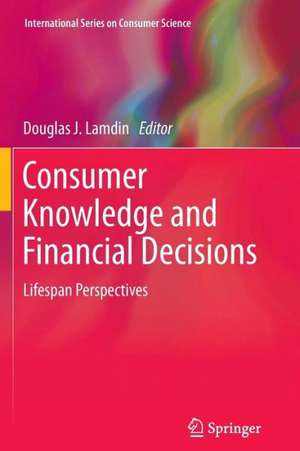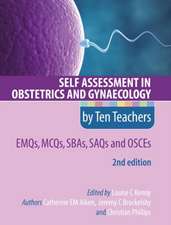Consumer Knowledge and Financial Decisions: Lifespan Perspectives: International Series on Consumer Science
Editat de Douglas J. Lamdinen Limba Engleză Paperback – 26 ian 2014
| Toate formatele și edițiile | Preț | Express |
|---|---|---|
| Paperback (1) | 643.34 lei 6-8 săpt. | |
| Springer – 26 ian 2014 | 643.34 lei 6-8 săpt. | |
| Hardback (1) | 649.71 lei 6-8 săpt. | |
| Springer – 22 noi 2011 | 649.71 lei 6-8 săpt. |
Preț: 643.34 lei
Preț vechi: 756.86 lei
-15% Nou
Puncte Express: 965
Preț estimativ în valută:
123.10€ • 128.85$ • 102.46£
123.10€ • 128.85$ • 102.46£
Carte tipărită la comandă
Livrare economică 01-15 aprilie
Preluare comenzi: 021 569.72.76
Specificații
ISBN-13: 9781489994172
ISBN-10: 1489994173
Pagini: 356
Ilustrații: XIV, 342 p.
Dimensiuni: 155 x 235 x 19 mm
Greutate: 0.5 kg
Ediția:2012
Editura: Springer
Colecția Springer
Seria International Series on Consumer Science
Locul publicării:New York, NY, United States
ISBN-10: 1489994173
Pagini: 356
Ilustrații: XIV, 342 p.
Dimensiuni: 155 x 235 x 19 mm
Greutate: 0.5 kg
Ediția:2012
Editura: Springer
Colecția Springer
Seria International Series on Consumer Science
Locul publicării:New York, NY, United States
Public țintă
ResearchCuprins
I. Understanding and Furthering Financial Knowledge.-Coming to Terms with Financial Literacy.-Cultivating Financial Mindfulness: A Dual-Process Theory.-Cognitive Development and Children’s Understanding of Personal Finance.-Financial Education for College Students.-The Current State of Financial Education in the U.S: How is Higher Education Helping?-An Overview of Contemporary Financial Education Initiatives Aimed at Minority Populations.-II. Credit, Home Purchase, and Bankruptcy.-Credit Cards as a Market Instrument: Consumer Understanding and Use.-Financial Education, Financial Knowledge, and Risky Credit Behavior of College Students.-Charging Ahead: An Exploratory Study of Financial Decision-Making Among Millennial Consumers.-Pre-Purchase Homebuyer Education and Counseling: Diverse Strategies for Diverse Homebuyers.-The Role of Default Counseling for Mortgage Borrowers in Financial Distress.-Non-Traditional Mortgage Products: Innovative or Toxic?-Debtors’ Assessments of Bankruptcy Financial Education.-III. Retirement, Insurance, and Investing.-Social Security Knowledge.-Financial Preparedness for Long-Term Care Needs in Old Age.-The Impact of Numeracy on Medicare Part D Insurance in Older Adults.-Target-date Mutual Funds.-Measuring the Performance of Life-Cycle Asset Allocation.-Stock Market Investing: Lessons from History.-Individual Investments in Higher Education
Notă biografică
Douglas Lamdin is a professor of economics at the University of Maryland, Baltimore County. He has also been a visiting professor of finance at the R.H. Smith School of Business at the University of Maryland, College Park. His teaching is primarily the introductory finance course, and the investments course (undergraduate and MBA). He has published more than 20 articles on financial economics and the economics of education in journals such as Journal of Family and Economic Issues, Journal of Regulatory Economics, Review of Economics and Statistics, Education Economics, and Contemporary Economic Policy. He edited The Managerial Economics Reader, Blackwell, 1994. He also serves on the editorial board of Business Economics, the journal of the National Association for Business Economics.
Textul de pe ultima copertă
It’s no secret that financial literacy skills are crucial to consumers’ lives: between today’s complex picture regarding credit and mortgages and the many changes in health insurance and pension programs, failure to follow the money can be devastating. But not all consumers learn the skills—and not all experts agree on a definition for financial literacy.
Covering a wide range of perspectives including family/consumer science, law, sociology, and public policy as well as finance and economics, Consumer Knowledge and Financial Decisions offers an accurate picture of American financial literacy and sets out real-world steps toward its improvement. The book starts by tackling methodological challenges to measuring financial competence, and takes a developmental approach to decision-making, such as encouraging responsibility in school children, reducing risky credit behaviors in young adults, and navigating Social Security and Medicare issues in elders. Each chapter focuses on what individuals need to know about a subject, the relationship of that knowledge to financial security, and programs that can improve decision-making or outcomes in that area. Among the topics covered:
This combination of timely data and practical ideas makes Consumer Knowledge and Financial Decisions a vital resource for a vital resource for professors, students, and policy analysts who study financial decisions.
Covering a wide range of perspectives including family/consumer science, law, sociology, and public policy as well as finance and economics, Consumer Knowledge and Financial Decisions offers an accurate picture of American financial literacy and sets out real-world steps toward its improvement. The book starts by tackling methodological challenges to measuring financial competence, and takes a developmental approach to decision-making, such as encouraging responsibility in school children, reducing risky credit behaviors in young adults, and navigating Social Security and Medicare issues in elders. Each chapter focuses on what individuals need to know about a subject, the relationship of that knowledge to financial security, and programs that can improve decision-making or outcomes in that area. Among the topics covered:
- Cognitive development and children’s financial understanding.
- Financial education for college students.
- Homebuyer counseling for diverse buyers.
- Debtors’ assessment of bankruptcy education.
- Stock market investing: lessons from history.
- Financial preparedness for long-term care needs.
This combination of timely data and practical ideas makes Consumer Knowledge and Financial Decisions a vital resource for a vital resource for professors, students, and policy analysts who study financial decisions.
Caracteristici
Goes beyond the working age population Integrates multidisciplinary viewpoints for broader understanding Maintains a public policy focus throughout Includes new and existing research Includes supplementary material: sn.pub/extras






















